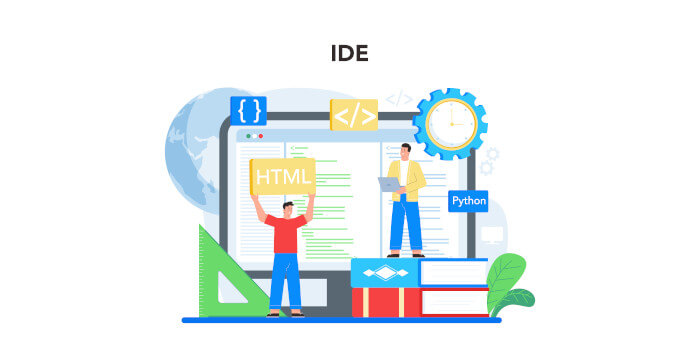Gambas is a free development environment based on a Basic interpreter with object extensions.
It is inspired by Visual Basic and Java. Although it has some similarities with Visual Basic, Gambas is not a clone.
With Gambas, you can design your application’s Graphical User Interface with QT or GTK+, access MySQL, PostgreSQL, Firebird, ODBC and SQLite databases, pilot KDE applications with DCOP, translate your program into any language, code network applications easily, create 3D OpenGL applications, develop CGI web applications, and much more.
Gambas has a component architecture that allows users to extend the language. Anyone can write components as shared libraries that dynamically add new native classes to the interpreter.
Gambas consists of:
- A compiler:
- Fast executable.
- Relies on the interpreter for optimization.
- Manages and compiles strong translations using the GNU gettext tools.
- An interpreter:
- Provides all of the native features of Basic.
- Loads classes on demand.
- Linking between classes is done entirely at runtime.
- An archiver:
- Creates a Gambas executable from a Gambas project directory.
- A scripter:
- A small Gambas executable that allows you to dump Gambas code into a text file.
- A development environment.
- Many extension components.
Characteristics of the Gambas Language
- Approximately 250 keywords and native functions to manage almost everything: arithmetic, strings, input-outputs, files, time…
- Full error management.
- Full process control, with pseudo-terminal management.
- Full support for watching input-output file descriptors.
- Event loop support with timers.
- Native UTF-8 string support.
- Full internationalization and translation support.
- Ability to call external functions in system shared libraries.
- Object oriented:
- Objects and classes.
- Properties, methods, constants and events.
- Public and private symbols.
- Polymorphism, i.e. virtual method dispatching.
- Single inheritance.
- Constructors and destructors.
- Array accessors, enumerators, sortable objects.
Website: gambas.sourceforge.net
Support: Documentation, GitLab Code Repository
Developer: Benoit Minisini and others
License: GNU General Public License v2.0
Gambas is written in C. Learn C with our recommended free books and free tutorials.
Return to Integrated Development Environments
| Popular series | |
|---|---|
| The largest compilation of the best free and open source software in the universe. Each article is supplied with a legendary ratings chart helping you to make informed decisions. | |
| Hundreds of in-depth reviews offering our unbiased and expert opinion on software. We offer helpful and impartial information. | |
| The Big List of Active Linux Distros is a large compilation of actively developed Linux distributions. | |
| Replace proprietary software with open source alternatives: Google, Microsoft, Apple, Adobe, IBM, Autodesk, Oracle, Atlassian, Corel, Cisco, Intuit, and SAS. | |
| Awesome Free Linux Games Tools showcases a series of tools that making gaming on Linux a more pleasurable experience. This is a new series. | |
| Machine Learning explores practical applications of machine learning and deep learning from a Linux perspective. We've written reviews of more than 40 self-hosted apps. All are free and open source. | |
| New to Linux? Read our Linux for Starters series. We start right at the basics and teach you everything you need to know to get started with Linux. | |
| Alternatives to popular CLI tools showcases essential tools that are modern replacements for core Linux utilities. | |
| Essential Linux system tools focuses on small, indispensable utilities, useful for system administrators as well as regular users. | |
| Linux utilities to maximise your productivity. Small, indispensable tools, useful for anyone running a Linux machine. | |
| Surveys popular streaming services from a Linux perspective: Amazon Music Unlimited, Myuzi, Spotify, Deezer, Tidal. | |
| Saving Money with Linux looks at how you can reduce your energy bills running Linux. | |
| Home computers became commonplace in the 1980s. Emulate home computers including the Commodore 64, Amiga, Atari ST, ZX81, Amstrad CPC, and ZX Spectrum. | |
| Now and Then examines how promising open source software fared over the years. It can be a bumpy ride. | |
| Linux at Home looks at a range of home activities where Linux can play its part, making the most of our time at home, keeping active and engaged. | |
| Linux Candy reveals the lighter side of Linux. Have some fun and escape from the daily drudgery. | |
| Getting Started with Docker helps you master Docker, a set of platform as a service products that delivers software in packages called containers. | |
| Best Free Android Apps. We showcase free Android apps that are definitely worth downloading. There's a strict eligibility criteria for inclusion in this series. | |
| These best free books accelerate your learning of every programming language. Learn a new language today! | |
| These free tutorials offer the perfect tonic to our free programming books series. | |
| Linux Around The World showcases usergroups that are relevant to Linux enthusiasts. Great ways to meet up with fellow enthusiasts. | |
| Stars and Stripes is an occasional series looking at the impact of Linux in the USA. | |
